
Chief Minister Yogi Adityanath has held the Gorakhpur seat for 19 years as a BJP lawmaker
Behen Mayawati is back in the game.
The BSP chief's stunning last-minute decision to support bitter political rival Samajwadi Party (SP) in the Gorakhpur and Phulpur by-elections to the Lok Sabha has paid rich dividends. The BJP lost both high-profile seats which had been won by 3 lakh plus margins in 2014 by Uttar Pradesh Chief Minister Yogi Adityanath and his deputy, Keshav Prasad Maurya.
While Phulpur has seen loyalties shift - from the Congress to the Samajwadi Party followed by the BSP and the BJP which won this constituency during the 2014 Modi wave - Gorakhpur has remained a saffron bastion, unflinchingly faithful for the last 30 years to the powerful Gorakhnath temple and its head priests Mahant Avaidyanath and his disciple, Yogi Adityanath who between them have won eight successive elections from here.
 This time, BJP candidate Upendra Shukla repeatedly asked voters to "destroy anyone who dared to challenge Maharaj-ji's honour on his own home turf, after he led the party to victory in Tripura, Gujarat and would do so once again, in Karnataka". But all went horribly wrong for the UP Chief Minister. Within a year of his taking over, the BJP, which won a historic 73 of the 80 Lok Sabha seats from UP in 2014 and 312 of the 403 assembly seats just last year, has lost the most high-profile elections in the country in a long time.
This time, BJP candidate Upendra Shukla repeatedly asked voters to "destroy anyone who dared to challenge Maharaj-ji's honour on his own home turf, after he led the party to victory in Tripura, Gujarat and would do so once again, in Karnataka". But all went horribly wrong for the UP Chief Minister. Within a year of his taking over, the BJP, which won a historic 73 of the 80 Lok Sabha seats from UP in 2014 and 312 of the 403 assembly seats just last year, has lost the most high-profile elections in the country in a long time.
Because for the first time in over two decades, the BSP and SP decided to fight together and not against each other in the politically key state of Uttar Pradesh. Mayawati didn't put up a candidate in either by-election. She supported those of SP chief Akhilesh Yadav instead.
In Phulpur, adjoining Allahabad, the BSP claims that a 'sangam' (confluence) of its votes with those of the SP worked because it says the 5.5 lakh Dalit voters in the constituency transferred their loyalties to the SP at Behen-ji's request. "It was not easy to convince them," an elated Ashok Gautam, zonal head of the BSP, told NDTV on Wednesday. "We had only one week in which to visit hundreds of villages. We told the people that the time had come to repay our debt to the Kurmi king Chhatrapati Shahuji Maharaj of Kolhapur who supported Babasaheb's Ambedkar's studies and career - by voting for another Kurmi in this election. And that since both the SP and BJP had put up Kurmi candidates, they must support Behen-ji's choice".
 In Gorakhpur, Mahesh Ram, a manager in a co-operative bank and die-hard Mayawati loyalist believes that the educated Dalits switched their votes to the SP without any hesitation. "Not all of them were BSP supporters, but they have seen the increase in attacks on Dalits after the BJP came to power in the state. And the recent desecration of Dr Ambedkar's statues in Meerut and Azamgarh proved to be the last straw.'' But Mahesh Ram admits he is unsure whether the SP-BSP pact, which Yogi Adityanath likened to an unholy alliance of the snake and the mongoose during a flood, will hold in the long run.
In Gorakhpur, Mahesh Ram, a manager in a co-operative bank and die-hard Mayawati loyalist believes that the educated Dalits switched their votes to the SP without any hesitation. "Not all of them were BSP supporters, but they have seen the increase in attacks on Dalits after the BJP came to power in the state. And the recent desecration of Dr Ambedkar's statues in Meerut and Azamgarh proved to be the last straw.'' But Mahesh Ram admits he is unsure whether the SP-BSP pact, which Yogi Adityanath likened to an unholy alliance of the snake and the mongoose during a flood, will hold in the long run.
For months, lower and backward castes in Uttar Pradesh have felt insecure about the prominence given to upper castes - Adityanath is a Thakur, for example, just one notch lower than a Brahmin in the caste hierarchy. The candidate in Gorakhpur, his home turf, was a Brahmin.
It is not just the BSP that can claim to have played a starring role in the SP's blockbuster victory. A host of caste-based outfits which had cropped up in UP before the 2017 assembly polls decided to support the SP. Among them is the Gorakhpur-based Nirbal Indian Shoshit Aam Dal, (NISHAD), whose national secretary, Pravin Nishad, was chosen as the SP's candidate. A 29-year-old engineer from the Nishad or fishermen community (Gorakhpur has around 3.5 lakh Nishads), he was also being backed by the Peace Party of Pasmanda or Scheduled Caste Muslims and a section of the OBCs and MBCs who allege the BJP has ignored their political aspirations after the state election last year which saw the state turned over to Adityanath.
 That election was a debacle for the SP, which won less than 50 of the 403 assembly seats. Mayawati won 19. Headed by Akhilesh Yadav, the SP began a quiet but expansive exercise to shrug off its Yadav tag and broaden its social base. SP bosses held several OBC sammelans or gatherings in which leaders from several smaller communities feeling marginalized by the BJP joined in. "In January this year, one such sammelan was held in Gorakhpur, in which the decision to fight the by elections together was taken. So what we are seeing today in Gorakhpur and Phulpur is also a result of the new social engineering undertaken by Akhilesh Yadav,'' says Gorakhpur-based political activist Manoj Singh. "It's similar to the one attempted so successfully by the BJP ahead of the 2014 and 2017 polls, which has now begun to unravel."
That election was a debacle for the SP, which won less than 50 of the 403 assembly seats. Mayawati won 19. Headed by Akhilesh Yadav, the SP began a quiet but expansive exercise to shrug off its Yadav tag and broaden its social base. SP bosses held several OBC sammelans or gatherings in which leaders from several smaller communities feeling marginalized by the BJP joined in. "In January this year, one such sammelan was held in Gorakhpur, in which the decision to fight the by elections together was taken. So what we are seeing today in Gorakhpur and Phulpur is also a result of the new social engineering undertaken by Akhilesh Yadav,'' says Gorakhpur-based political activist Manoj Singh. "It's similar to the one attempted so successfully by the BJP ahead of the 2014 and 2017 polls, which has now begun to unravel."
That the BJP was nervous about the outcome of the Gorakhpur and Phulpur by-polls was obvious even before Mayawati called a temporary truce on her 24-year-old feud with the Samajwadi Party. The campaigns in both Lok Sabha constituencies were driven from the start not by the contesting candidates, but by their outgoing MPs, Yogi Adityanath and his deputy, Keshav Prasad Maurya.
 Sensing it had an outside chance of winning in Phulpur which has a large presence of Muslims, Dalits, Yadvas and other OBCs, the SP was more combative here than in Gorakhpur and openly accused the BJP of propping up don-turned-politician Ateeq Ahmed as an independent candidate to split the constituencies 2.5 lakh Muslim votes. Ateeq Ahmed, a former Samajwadi leader who has also been an MP from Phulpur is in jail on charges that include murder.
Sensing it had an outside chance of winning in Phulpur which has a large presence of Muslims, Dalits, Yadvas and other OBCs, the SP was more combative here than in Gorakhpur and openly accused the BJP of propping up don-turned-politician Ateeq Ahmed as an independent candidate to split the constituencies 2.5 lakh Muslim votes. Ateeq Ahmed, a former Samajwadi leader who has also been an MP from Phulpur is in jail on charges that include murder.
Meanwhile, Yogi Adityanath, unsure whether issues of development would find any resonance in Gorakhpur where more than 1,300 children lost their lives at the main local hospital last year due to alleged medical negligence, stuck to his communally-divisive rhetoric, exhorting the crowds to reject the Samajwadi Party or the "rule of Aurangzeb", referring to the support it draws among Muslims.
 "What else can Maharaj-ji do," a bhakt argued at one of his public meetings. "He knows there is no issue in this election, but there is a strong element of poll fatigue, so it's going to be tough to motivate people to come out and vote, especially when he himself is not in the fray."
"What else can Maharaj-ji do," a bhakt argued at one of his public meetings. "He knows there is no issue in this election, but there is a strong element of poll fatigue, so it's going to be tough to motivate people to come out and vote, especially when he himself is not in the fray."
Yogi's task was made more difficult by the invisibility of the BJP candidate, Upendra Dutt Shukla, who was unwell during the campaign. In any case, there was little enthusiasm amongst the people of Gorakhpur for Yogi's successor who was relatively unknown outside the party organisation. As the Chief Minister stepped up for Mr Shukla, the opposition repeatedly pointed out to the voters that Yogi Adityanath was not contesting the polls this time round; the Chief Minister's response that he was indeed contesting - in the form of Upendra Shukla - rang hollow.
 Then, just a week before voting, came the Mayawati shocker, which forced Yogi Adityanath to intensify his campaign - he addressed a record 16 public meetings to keep his flock together. But neither his intimate connect with Gorakhpur nor the influence of the temple could outstrip the force of Mayawati and the SP coming together. The high number of votes polled by the SP in the three segments of Gorakhpur constituency which have a large concentration of farmers and communities who live off the land point to a clear urban-rural divide in the election. A sign of agrarian distress has also impacted voting in Phulpur, where Keshav Prasad Maurya's attempts to make his party's development agenda the campaign's centre piece failed even more miserably.
Then, just a week before voting, came the Mayawati shocker, which forced Yogi Adityanath to intensify his campaign - he addressed a record 16 public meetings to keep his flock together. But neither his intimate connect with Gorakhpur nor the influence of the temple could outstrip the force of Mayawati and the SP coming together. The high number of votes polled by the SP in the three segments of Gorakhpur constituency which have a large concentration of farmers and communities who live off the land point to a clear urban-rural divide in the election. A sign of agrarian distress has also impacted voting in Phulpur, where Keshav Prasad Maurya's attempts to make his party's development agenda the campaign's centre piece failed even more miserably.
"It shows that a well-oiled election machinery like the BJP can also break down when all the promises made by the PM on ending corruption and providing jobs begins to sound hollow. You can't win elections forever simply by managing booths, you need to stop farmer suicides and bring the Nirav Modis of India to justice first,'' the firebrand Samajwadi Party leader, Richa Singh, told NDTV from Allahabad.
The most keenly-watched political experiment ahead of the 2019 Lok Sabha election has worked for the opposition. "It is a lesson for us", Yogi Adityanath said this evening, adding, "we underestimated the impact of the BSP-SP alliance."
The BSP chief's stunning last-minute decision to support bitter political rival Samajwadi Party (SP) in the Gorakhpur and Phulpur by-elections to the Lok Sabha has paid rich dividends. The BJP lost both high-profile seats which had been won by 3 lakh plus margins in 2014 by Uttar Pradesh Chief Minister Yogi Adityanath and his deputy, Keshav Prasad Maurya.
While Phulpur has seen loyalties shift - from the Congress to the Samajwadi Party followed by the BSP and the BJP which won this constituency during the 2014 Modi wave - Gorakhpur has remained a saffron bastion, unflinchingly faithful for the last 30 years to the powerful Gorakhnath temple and its head priests Mahant Avaidyanath and his disciple, Yogi Adityanath who between them have won eight successive elections from here.
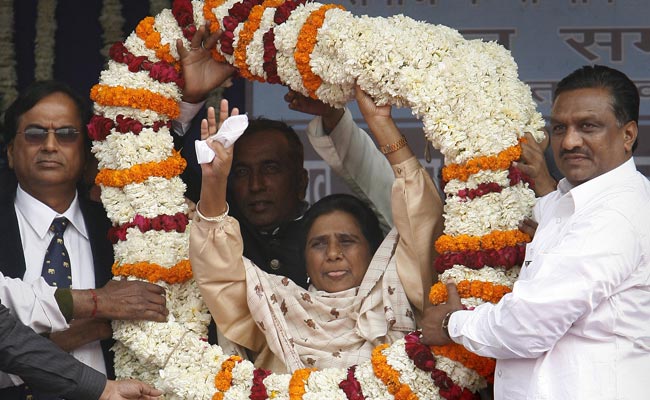
BSP chief Mayawati's decision to join hands with Akhilesh Yadav's Samajwadi Party has paid off
Because for the first time in over two decades, the BSP and SP decided to fight together and not against each other in the politically key state of Uttar Pradesh. Mayawati didn't put up a candidate in either by-election. She supported those of SP chief Akhilesh Yadav instead.
In Phulpur, adjoining Allahabad, the BSP claims that a 'sangam' (confluence) of its votes with those of the SP worked because it says the 5.5 lakh Dalit voters in the constituency transferred their loyalties to the SP at Behen-ji's request. "It was not easy to convince them," an elated Ashok Gautam, zonal head of the BSP, told NDTV on Wednesday. "We had only one week in which to visit hundreds of villages. We told the people that the time had come to repay our debt to the Kurmi king Chhatrapati Shahuji Maharaj of Kolhapur who supported Babasaheb's Ambedkar's studies and career - by voting for another Kurmi in this election. And that since both the SP and BJP had put up Kurmi candidates, they must support Behen-ji's choice".
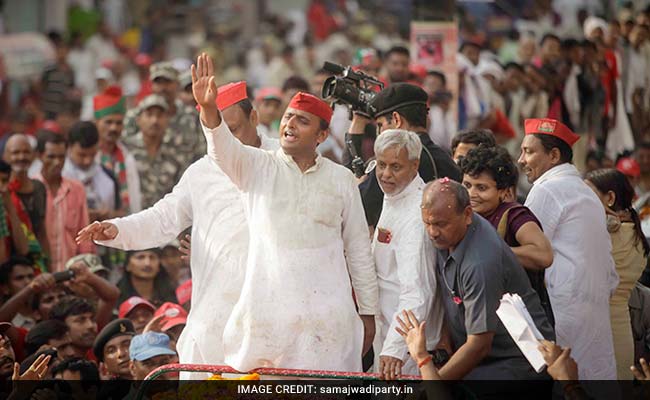
SP chief Akhilesh Yadav's new social engineering has worked on the ground
For months, lower and backward castes in Uttar Pradesh have felt insecure about the prominence given to upper castes - Adityanath is a Thakur, for example, just one notch lower than a Brahmin in the caste hierarchy. The candidate in Gorakhpur, his home turf, was a Brahmin.
It is not just the BSP that can claim to have played a starring role in the SP's blockbuster victory. A host of caste-based outfits which had cropped up in UP before the 2017 assembly polls decided to support the SP. Among them is the Gorakhpur-based Nirbal Indian Shoshit Aam Dal, (NISHAD), whose national secretary, Pravin Nishad, was chosen as the SP's candidate. A 29-year-old engineer from the Nishad or fishermen community (Gorakhpur has around 3.5 lakh Nishads), he was also being backed by the Peace Party of Pasmanda or Scheduled Caste Muslims and a section of the OBCs and MBCs who allege the BJP has ignored their political aspirations after the state election last year which saw the state turned over to Adityanath.
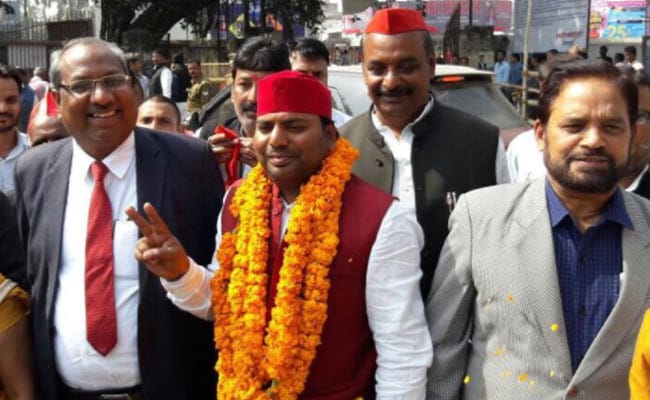
Pravin Nishad, from the fishermen community, has won Gorakhpur for the Samajwadi Party
That the BJP was nervous about the outcome of the Gorakhpur and Phulpur by-polls was obvious even before Mayawati called a temporary truce on her 24-year-old feud with the Samajwadi Party. The campaigns in both Lok Sabha constituencies were driven from the start not by the contesting candidates, but by their outgoing MPs, Yogi Adityanath and his deputy, Keshav Prasad Maurya.
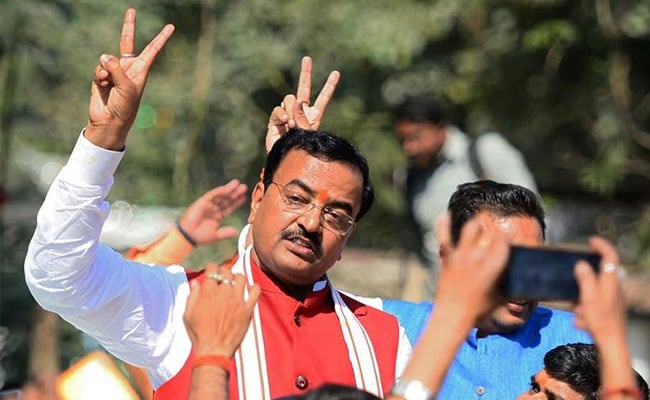
Uttar Pradesh Deputy Chief Minister Keshav Prasad Maurya was unable to consolidate his 2014 victory in Phulpur (File photo)
Meanwhile, Yogi Adityanath, unsure whether issues of development would find any resonance in Gorakhpur where more than 1,300 children lost their lives at the main local hospital last year due to alleged medical negligence, stuck to his communally-divisive rhetoric, exhorting the crowds to reject the Samajwadi Party or the "rule of Aurangzeb", referring to the support it draws among Muslims.
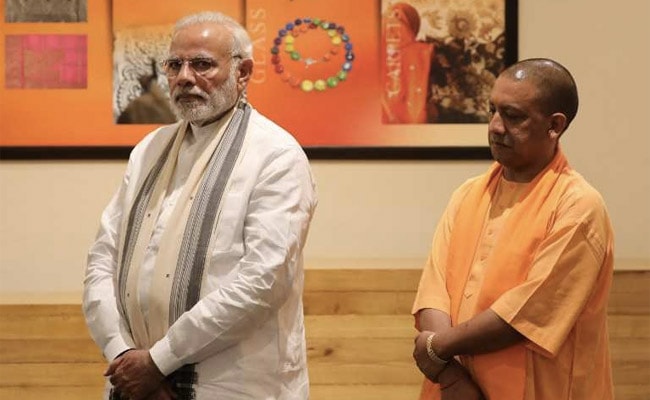
Yogi Adityanath was the face of the BJP's campaign for Gorakhpur and Phulpur, calling in no star campaigners from the centre
Yogi's task was made more difficult by the invisibility of the BJP candidate, Upendra Dutt Shukla, who was unwell during the campaign. In any case, there was little enthusiasm amongst the people of Gorakhpur for Yogi's successor who was relatively unknown outside the party organisation. As the Chief Minister stepped up for Mr Shukla, the opposition repeatedly pointed out to the voters that Yogi Adityanath was not contesting the polls this time round; the Chief Minister's response that he was indeed contesting - in the form of Upendra Shukla - rang hollow.
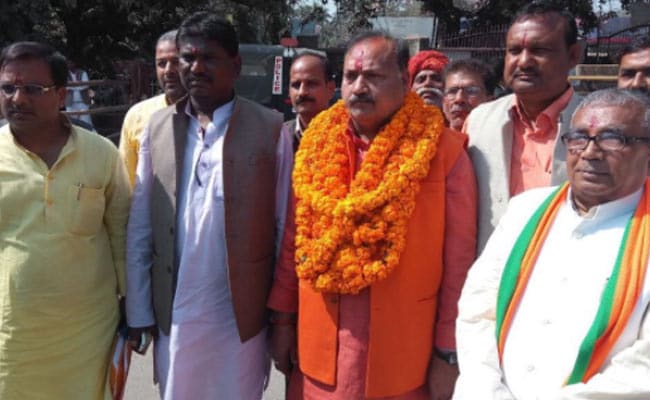
Upendra Shukla is the first Brahmin candidate fielded by the BJP in Gorakhpur in 30 years
"It shows that a well-oiled election machinery like the BJP can also break down when all the promises made by the PM on ending corruption and providing jobs begins to sound hollow. You can't win elections forever simply by managing booths, you need to stop farmer suicides and bring the Nirav Modis of India to justice first,'' the firebrand Samajwadi Party leader, Richa Singh, told NDTV from Allahabad.
The most keenly-watched political experiment ahead of the 2019 Lok Sabha election has worked for the opposition. "It is a lesson for us", Yogi Adityanath said this evening, adding, "we underestimated the impact of the BSP-SP alliance."
Track Latest News Live on NDTV.com and get news updates from India and around the world

